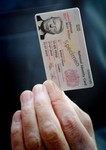
The writer Salman Rushdie hit Twitter on Monday morning with a flurry of exasperated posts.
Facebook, he wrote, had deactivated his account, demanded proof of identity and then turned him into Ahmed Rushdie, which is how he is identified on his passport. He had never used his first name, Ahmed, he pointed out; the world knows him as Salman.
Would Facebook, he scoffed, have turned J. Edgar Hoover into John Hoover?
“Where are you hiding, Mark?” he demanded of Mark Zuckerberg, Facebook’s chief executive, in one post. “Come out here and give me back my name!”
The Twitterverse took up his cause. Within two hours, Mr. Rushdie gleefully declared victory: “Facebook has buckled! I’m Salman Rushdie again. I feel SO much better. An identity crisis at my age is no fun.”
Mr. Rushdie’s predicament points to one of the trickiest notions about life in the digital age: Are you who you say you are online? Whose business is it — and why?
As the Internet becomes the place for all kinds of transactions, from buying shoes to overthrowing despots, an increasingly vital debate is emerging over how people represent and reveal themselves on the Web sites they visit. One side envisions a system in which you use a sort of digital passport, bearing your real name and issued by a company like Facebook, to travel across the Internet. Another side believes in the right to don different hats — and sometimes masks — so you can consume and express what you want, without fear of offline repercussions.
The argument over pseudonyms — known online as the “nym wars” — goes to the heart of how the Internet might be organized in the future. Major Internet companies like Google, Facebook and Twitter have a valuable stake in this debate — and, in some cases, vastly different corporate philosophies on the issue that signal their own ambitions.
Facebook insists on what it calls authentic identity, or real names. And it is becoming a de facto passport vendor of sorts, allowing its users to sign into seven million other sites and applications with their Facebook user names and passwords.
Google’s social network, Google+, which opened up to all comers in September, likewise wants the real names its users are known by offline, and it has frozen the accounts of some perceived offenders.
But Google has indicated more recently that it will eventually allow some use of aliases. Vic Gundotra, the Google executive responsible for the social network, said at a conference last month that he wanted to make sure its “atmosphere” remained comfortable even with people using fake names. “It’s complicated to get this right,” he said.
Twitter, by sharp contrast, follows a laissez-faire approach, allowing the use of pseudonyms by WikiLeaks supporters and a prankster using the name @FakeSarahPalin, among many others. It does consider deceitful impersonation to be grounds for suspension.
The debate over identity has material consequences. Data that is tied to real people is valuable for businesses and government authorities alike. Forrester Research recently estimated that companies spent $2 billion a year for personal data, as Internet users leave what the company calls “an exponentially growing digital footprint.”
And then there are the political consequences. Activists across the Arab world and in Britain have learned this year that social media sites can be effective in mobilizing uprisings, but using a real name on those sites can lead authorities right to an activist’s door.
“The real risk to the world is if information technology pivots to a completely authentic identity for everyone,” said Joichi Ito, head of the Media Lab at the Massachusetts Institute of Technology. “In the U.S., maybe you don’t mind. If every kid in Syria, every time they used the Internet, their identity was visible, they would be dead.”
Read more . . .
Bookmark this page for “online identity” and check back regularly as these articles update on a very frequent basis. The view is set to “news”. Try clicking on “video” and “2” for more articles.







